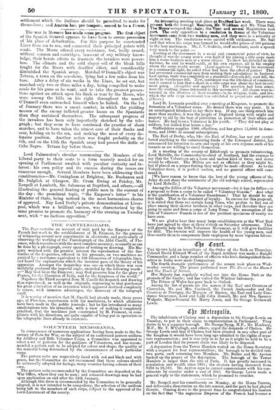VOLUNTEER MEMORANDA.
In consequence of numerous applications having been made to the Se- cretary of State for War, on the subject of an authorized pattern uniform far Artillery and Rifle Volunteer Corps, a Committee was appointed to select a set of patterns for the guidance of Volunteers, and has recom- mended a pattern suit to be adopted for colour and shape, the quality of the material being determined by the circumstances of each particular corps.
The pattern suits are respectively faced with red and black and with green, but the Committee do not recommend that these colours should be universally adopted for facings, many counties having colours of their OWD.
The pattern suits recommended by the Committee are deposited at the War Office, where they can be seen ; and coloured drawings may be had upon application on and after the 24th January. Although this dress is recommended by the Committee to be generally adopted, it is not intended to be compulsory, the selection of the uniform being left to the members of each corps, subject to the approval of the Lord-Lieutenant of the county.
An interesting meeting took place at Braked last week. There were present both the borough Members, Mr. Wickham and Mr. Titus Salt. The Mayor occupied the chair; the \near and several Magistrates took part. 1U only opposition to a resolution in favour of the Volunteer movement came from two working isem and they were in a minority of eight or ten. The resolutions were carried with enthusiasm. Mr. Salt said that when the corps was formed he would offer prizes of 100 guineas to the best marksmen. Mr. J. V. Godwin, stuff merchant, made a speech very much to the point :— Looking at the movement in a social and commercial point of view, he thought it was the young man's own fault if his joining a rifle corps made him a worse business man or a worse citizen. To show his disbelief in that doctrine, he said he would outfit, at his own expense, all in his employ whom the corps would accept. (Loud applause.) Viewing the movement in a commercial light, he asked what had been the effect of panics? They had prevented commercial men from making their calculations in business. Last spring, trade was completely at a standstill—Consols fell, wool fell, the stocks in warehouses fell. Now, confidence was the life-blood of commerce, and it seemed to him that a share in a rifle corps was about the best invest- ment going. (Laughter and applause.) The question had been asked, were the working classes interested in this movement? All classes were in- terested in the liberties of their country—in its religion, trade, and law, which the rifle corps movement was calculated to perpetuate and protect. (Cheers.)
Lord St. Leonards presided over a meeting at Kingston, to promote the formation of a Volunteer corps. He denied there was any panic. It is an unmitigated falsehood to say there was. If anyone thing struck him more than another, it was the people of England rising with might and majesty to aid by the beat of patriotism in protection of their altars and homes. He had been a Volunteer in his youth. "They did not play at soldiers, but drilled four hours a day." • Staffordshire supplies 1900 effectives, and has given 12,0001. in dona- tions, and 1800/. in annual subscriptions.
The Earl of Derby, who, like the Earl of Sefton, has not yet contri- buted anything to the volunteering funds of the Liverpool district, has announced his intention to arm and equip at his own expense such of his tenants as are willing to enrol themselves.
At a meeting of the county of Edinburgh to promote volunteering, Lord Melville, the Commander-in-chief of Scotland, had the courage to say that the Volunteers are a loose and useless kind of force, and never would be efficient. The Militia are not as efficient as they might be, but if placed on a proper footing they might be made efficient. As to the Volunteer force, it is perfect useless, and no general officer will com- mand it.
[We have reason to know that the best of the young officers of the Army do not share the sentiments of the old red-tape school, represented by Lord Melville.] Among the follies of the Volunteer movement—for it has its follies—is a proposal to form a corps to be called "Volunteer Guards." And what is the qualification of a Volunteer Guardsman ? That he ahould be six feet high. That is the standard of loyalty. In excuse for this proposal, it is stated that there are certain Long Toms, who profess to feel out of place among their shorter brethren in other corps' and therefbre they are going to unite and form a corps of Long Toms. The assumption of the title of Volunteer Guards is one of the prettiest specimens of vanity we have seen.
We are glad to hear that many large establishments at the West End have just agreed to close at three o'clock on Saturday afternoons. This will greatly help the Rifle Volunteer Movement, as it will give facilities for drill. The exercise will improve the health of the young men, and thus enable them to compensate their employers by more vigorous labour.


























 Previous page
Previous page